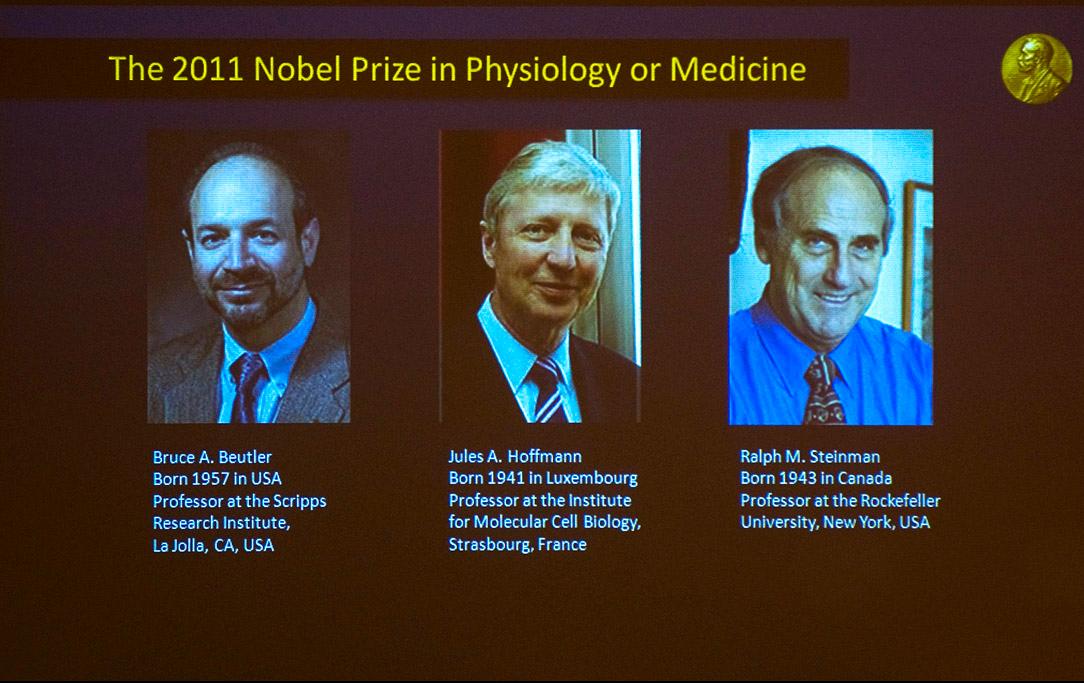Nobel decision: Prize awarded after winner’s death (Update)
A picture shows a television screen at the Nobel Assembly at the Karolinska Institute in Stockholm announcing that (L-R) Bruce Beutler of the US, Frenchman Jules Hoffmann of France and Ralph Steinman of Canada had won the 2011 Nobel Prize in Physiology or Medicine.
Update: The Nobel Foundation has decided that the Nobel Prize awarded to cell biologist Ralph Steinman will remain unchanged, though he died three days before the prize was announced. The Nobel Committee held an emergency meeting Monday, and decided to grant the award as it was given in good faith, based on the fact that they believed Steinman was alive, reports the AP.
—
One of the three recipients of the Nobel Prize in medicine died three days before the prize winners were announced, calling the validity of the prize into question. He had extended his own life through a therapy that he designed, reports the NY Times.
Ralph Steinman, a biologist at the Rockefeller University, would have been ineligible for the prize had the committee been aware of his death, reports CNN. Nobel rules do not allow awarding a post-humous prize, unless the winner dies after the award is announced.
However, his death was not mentioned when the awards were announced, reports the CNN.
The Nobel Committee of the Karolinksa Institute in Sweden, which selects the winners said it would study the rules of the prize, which has been awarded since 1900. However, they have issued a statement, that continues to refer to Steinman as "one of this year's three Nobel Laureates in Physiology or Medicine."
The Canadian born Steinman, "discovered the immune system's sentinel dendritic cells and demonstrated that science can fruitfully harness the power of these cells and other components of the immune system to curb infections and other communicable diseases," according to a statement by the University.
Steinman had been diagnosed with pancreatic cancer four years prior to the announcement of the prize. He used the immunotherapy that he had designed to extend his life, reports Reuters.
Steinman was awarded with one half of the prize. The other half has been awarded to Dr. Bruce Beutler at Scripps Research Institute in California, and Dr. Jules A. Hoffman of France.
Their discoveries are essential steps in the human body's immune system's response to infection. Their discoveries could help yield better treatments of cancer, rheumatoid arthritis, and type 1 diabetes, multiple sclerosis, and chronic inflammatory disease, said Goran Hansson, the award committee secretary to the AP.
Other Nobel Prizes including the prizes for achievement in Physics and Chemistry will be announced this week as well. The Nobel Peace Prize, the most anticipated of the Nobel prizes will be announced on Friday.
The story you just read is accessible and free to all because thousands of listeners and readers contribute to our nonprofit newsroom. We go deep to bring you the human-centered international reporting that you know you can trust. To do this work and to do it well, we rely on the support of our listeners. If you appreciated our coverage this year, if there was a story that made you pause or a song that moved you, would you consider making a gift to sustain our work through 2024 and beyond?
